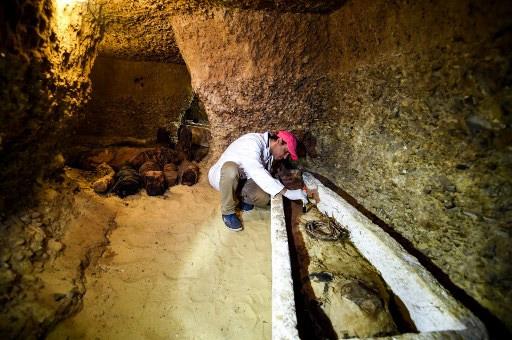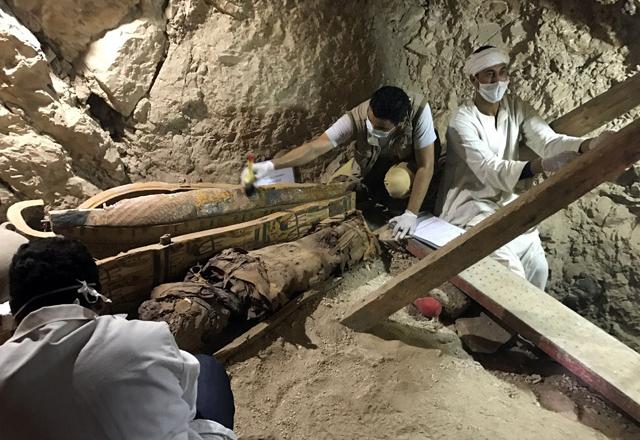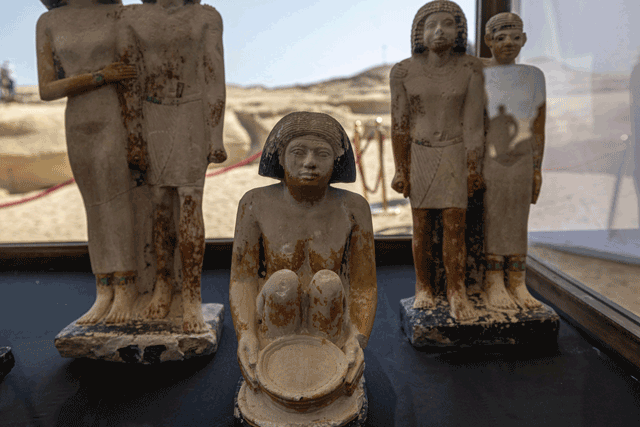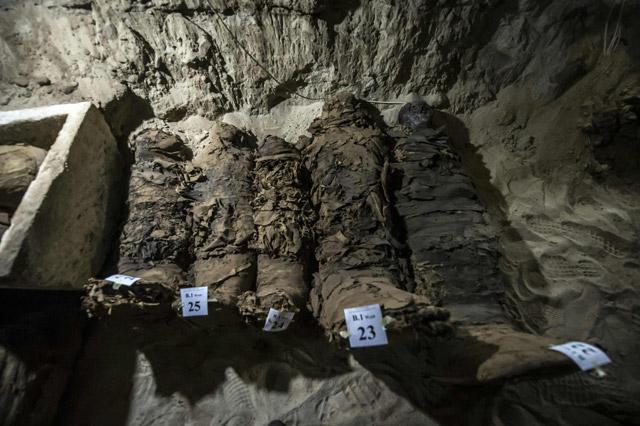You are here
Thousands-year-old Egyptian sarcophagus opened on live TV
By AFP - Apr 08,2019 - Last updated at Apr 08,2019

An archeologist brushes a newly-discovered mummy laid inside a sarcophagus, part of a collection found in burial chambers dating to the Ptolemaic era (323-30BC) at the necropolis of Tuna El Gebel in Egypt's southern Minya province, about 340 kilometres south of the capital Cairo, on February 2 (AFP photo)
WASHINGTON — A sarcophagus containing an Egyptian high priest was opened on live TV on Sunday during a special two-hour broadcast by the American channel Discovery.
"Expedition Unknown: Egypt Live" aired from the site outside Minya, which is along the Nile River south of Cairo and its Giza pyramids.
Archeologists recently discovered a network of vertical shafts at the site which led to tunnels and tombs containing 40 mummies "believed to be part of the noble elite".
After exploring other tombs — finding artifacts like statues, amulets, canopic jars used to store organs, and other mummies including one that had decomposed to a skeleton — they crawled to the chamber containing the intricately carved sarcophagus.
It took the strength of several people to open.
And the team's efforts had not gone to waste: inside was a pristinely linen-wrapped mummy surrounded by treasure including gold.
"I can't believe this, this is incredible," exclaimed Zahi Hawass, an Egyptian archaeologist and former antiquities minister, who had taken charge of the expedition with American explorer Josh Gates as the host of the broadcast.
A Discovery spokesman previously told AFP that the project was set up in collaboration with Egypt's antiquities ministry.
‘Like a royal burial’
Gates said the mummy was that of a high priest of Thoth, the ancient Egyptian god of wisdom and magic, and dated to Ancient Egypt's 26th dynasty — the last native dynasty to rule until 525BC.
"Towards the end of Ancient Egypt, the power really was with the high priests and you can see this... almost feels like a royal burial," Gates said.
Cairo has sought to promote archeological discoveries across the country in a bid to revive tourism hit by turmoil after the 2011 uprising against Hosni Mubarak.
Asked by AFP about a possible financial deal between the channel and the Egyptian state for permission to film and open the grave, the spokesman for Discovery refused to comment.
"It's a media spectacle in the end — but it could make people love antiquities and is a good promotional opportunity for tourism, if done right," an Egyptian archeologist who asked to remain anonymous told AFP.
However, she asked: "If money is being paid by a major channel to the ministry to show antiquities, where is it going to end up?"
"Will it go in the state's purse-strings or end up elsewhere? We need more transparency on where the money is going."
Egyptian President Abdel Fattah Sisi has overseen a crackdown on dissent, banning protests and jailing Islamists as well as liberal and secular activists.
He regularly evokes political stability to draw foreign investment.
The tourism sector has begun to return, with arrivals reaching 8.3 million in 2017, according to government figures.
That still falls far short of the 14.7 million in 2010.
Discovery's broadcast also comes with global interest in Egyptian archeology generated by a "once in a generation" exhibition about the pharaoh Tutankhamun, which opened in Paris last month and will tour the world.
Related Articles
LUXOR, Egypt — Egyptian archaeologists have unearthed several mummies, colourful wooden sarcophagi and more than 1,000 funerary statues in a
SAQQARA, Egypt — Egypt unveiled on Thursday a gold-laced mummy and four tombs, including of an ancient king’s “secret keeper”, discovered in
TOUNA EL GABAL, Egypt — Egyptian archaeologists have discovered 17 mummies in desert catacombs in Minya province, an "unprecedented" find fo














